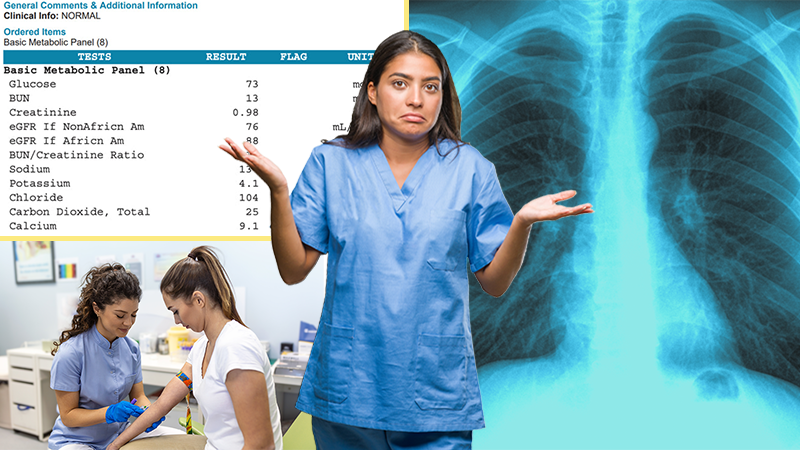
Practice Perfect 908
The Pod Periop Medical Management Series:
How Helpful Is Testing?
The Pod Periop Medical Management Series:
How Helpful Is Testing?

Welcome back to our limited series on perioperative medical management for the podiatrist! In last week’s issue, we introduced this topic with the admonition that decision-making for patients undergoing surgery should be based on the history and physical examination with a consideration for perioperative risk factors rather than ordering a battery of “screening” labs. Let’s take a continued look at just why this is so by considering how useful our commonly ordered tests are to determine perioperative patient safety.
The Chest Radiograph: Don’t Even Bother!
There is very weak evidence that the preoperative chest radiograph is helpful. When ordered, a chest radiograph has some abnormality 2.5 – 37% of the time.1 However, very few of these abnormalities will require any action on the part of the physician. Interestingly, chest radiographs have led to a change in perioperative management 0 – 2.5% of the time.1 Why bother ordering a test, exposing a patient to radiation, and forcing the physician to treat an ancillary finding that would not otherwise lead to a change in management? Don’t even bother ordering a chest radiograph preop.
Don’t even bother ordering a chest radiograph preop.
“But wait, Shapiro,” you might be shouting. “I need to check and make sure the heart and lungs are ok.” There are, in fact, better ways to determine cardiopulmonary risk which we’ll get into in a future editorial. But so I don’t leave you hanging, pulmonary function testing is a much better indicator in patients with disorders like asthma and COPD.
The chest radiograph should, then, be reserved for those patients with symptoms of active chest disease during the history and physical.2
Complete Blood Count: How Complete Is It Really?
Routine testing leads to management changes in only 0.1 – 2.7% of patients.1 Again, asymptomatic abnormalities are likely to be high. Can you recall the last time you cancelled a pending elective foot surgery because a patient’s MCHC was low? This test does not need to be ordered routinely but may be helpful, again, based on the history and physical. Consider the physiology of those disorders that may lead to anemia, such as renal disease, diabetes, and a menstruating female, for example. It is additionally recommended to order a CBC if there’s an expectation for significant blood loss, if the patient had limited primary care prior to the surgery, and if there is a suspected polycythemia.1
Coagulation Studies: Don’t Let Your Knowledge Clot Up!
In a study by Suchman and Griner, they found only 1 patient in 750 benefited from coagulation studies ordered preop3 and these are considered nonbeneficial in low risk populations.2 It’s recommended that coagulation studies should be ordered in patients with a history or examination consistent with a bleeding disorder and in liver disease, malnutrition, and malabsorption syndromes.2,3
Serum labs: The BMP and COMP
As with everything we’ve been discussing so far, it is unnecessary to order a basic metabolic panel (BMP) or complete metabolic panel (COMP) for healthy patients. It is recommended that these tests are only ordered with a known active or history of organ disease or known history of cancer because, again, abnormalities are common but do not result in changes in perioperative management.1 Instead of the shot gun method to check random organs that are unlikely to have any effect on the perioperative situation, instead use your history and physical to guide your orders. For example, a patient with a history of cancer should have the liver tested to screen for metabolic disease. Similarly, for my diabetic patients I typically order a BMP to check renal function (among others that we’ll discuss in a future editorial).
With all this said, can you see the trend? Most of these tests do not change perioperative management despite the presence of some abnormal results. Instead, let your H&P guide you.
Best wishes.

Jarrod Shapiro, DPM
PRESENT Practice Perfect Editor
[email protected]

-
Munro J, Booth A, Nicholl J. Routine perioperative testing: a systemic review of the evidence. Health Technol Assess. 1997;1(12):1-74.
Follow this link -
Medical Management of the Surgical Patient, 3rd Ed. Merli G and Weitz H Editors. Saunders Elsevier, Philadelphia, 2008.
Follow this link -
Suchman A, Griner P. Diagnostic uses of the activated partial thromboplastin time and prothrombin time. Ann Internal Med. 1986 Jun;104(6):810-816.
Follow this link

































Comments
There are 0 comments for this article